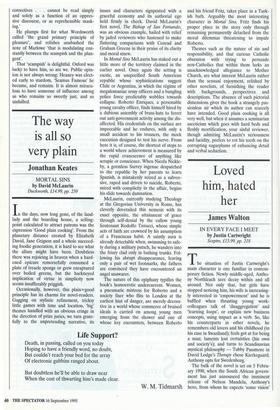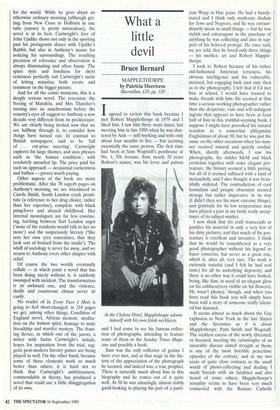Loved him, hated her
James Walton
IN EVERY FACE I MEET by Justin Cartwright Sceptre, £15.99, pp. 218 The situation of Justin Cartwright's main character is one familiar in contem- porary fiction. Newly middle-aged, Antho- ny Northleach sees decay within and all around. Not only that, but girls have stopped noticing him, his wife is increasing- ly interested in 'empowerment' and he is baffled when thrusting young work- colleagues talk of `disaggregation' and `learning loops', or explain new business concepts, using impact as a verb. So, like his counterparts in other novels, he remembers old lovers and his childhood (in his case in Swaziland); feels got at for being a man; laments lost certainties (his own and society's); and turns to Scandinavian mystical philosophy — Tubby Passmore in David Lodge's Therapy chose Kierkegaard, Anthony opts for Swedenborg.
The bulk of the novel is set on 5 Febru- ary 1990, when the South African govern- ment has just announced the imminent release of Nelson Mandela, Anthony's hero, from whom he expects 'some vision' for the world. While he goes about an otherwise ordinary morning (although get- ting from New Cross to Holborn in one tube journey is pretty miraculous), the novel is at its best. Cartwright's love of John Updike shows not only in the sporting past his protagonist shares with Updike's Rabbit, but also in Anthony's mania for noticing his surroundings. The resulting precision of reference and observation is always illuminating and often funny. The spare style and fondness for short sentences perfectly suit Cartwright's tactic of letting minutiae both create and comment on the bigger picture.
And for all the comic moments, this is a deeply serious novel. The recession, the freeing of Mandela, and Mrs Thatcher's turning into an anachronism before the country's eyes all suggest to Anthony a new decade very different from its predecessor.
We are clearly being invited now that we are halfway through it, to consider how things have turned out. In contrast to British newspapers, said to be 'full of . . . cut-price sneering', Cartwright explores his large themes, and uses phrases such as 'the human condition', with resolutely uncurled lip. The price paid for such an approach — occasional earnestness and bathos — proves worth paying.
Other aspects of the book are more problematic. After the 70 superb pages on Anthony's morning, we are introduced to Carole Smith, South London crack prosti- tute (a reference to her drug choice, rather than her expertise), complete with black pimp/lover and abused childhood. Her internal monologues are far less convinc- ing, lurching between Sarf London argot (`none of the residents would talk to her no more') and the suspiciously literary (She sees her own eyes sometimes, that they look sort of bruised from the inside'). The whiff of sociology is never far away, and we return to Anthony every other chapter with relief.
Of course the two worlds eventually collide — at which point a novel that has been doing nicely without it, is suddenly swamped with incident. The transformation is an awkward one, and the violence, thrills and courtroom climax never sit easily.
No reader of In Every Face I Meet is going to feel short-changed: in 218 pages we get, among other things, Condition of England novel, African memoir, medita- tion on the human spirit, homage to male friendship and murder mystery. The fram- ing device, in which one of the jurors, a writer with Justin Cartwright's initials, hopes for inspiration from the trial, sug- gests post-modern literary games are being played as well. On the other hand, because some of these elements work so much better than others, it is hard not to think that Cartwright's ambitiousness, commendable in theory, has produced a novel that could use a little disaggregation of its own.



































































 Previous page
Previous page